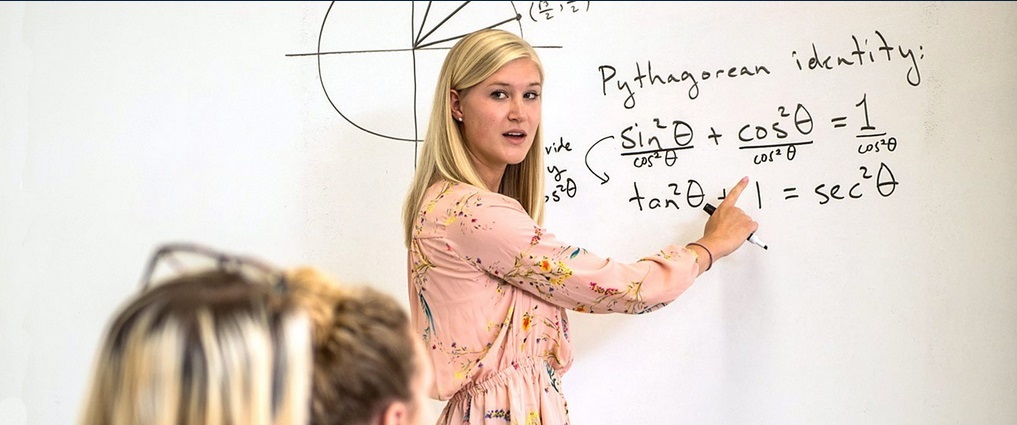| |
Feb 11, 2026
|
|
|
|
|
2023-2024 Undergraduate Catalog [Archived Catalog]
Mathematics (B.S.) - Teaching Specialization
|
|

 
%20-%20Teaching%20Specialization.png)
Program Contact/Coordinator
Kurt Cogswell, Department Head
Department of Mathematics and Statistics
Chicoine Architecture, Mathematics and Engineering Hall 209
605-688-6196
Program Information
Secondary school mathematics educators need to be mathematicians as well as skilled educators, so the Mathematics Education Specialists take the same challenging core upper level mathematics courses as those math majors pursuing other professional goals. In addition to this rigorous mathematics curriculum, Mathematics Education Specialists take the full block of education courses. This program allows graduates to find meaningful careers in secondary education, as well as preparing students for graduate study.
Accreditation, Certification, and Licensure
Accreditation
Council for the Accreditation of Educator Preparation (CAEP)
South Dakota Department of Education
Certification and Licensure
- Completion of an approved bachelor’s Secondary preparation program.
- Completion of an approved South Dakota Indian studies course.
- Pass the state designated content knowledge test or 2.7 GPA in content major coursework.
- Pass the state designated pedagogy test.
- Completion of a Suicide Awareness and Prevention training, available free online through the South Dakota Department of Education.
- Apply online with the South Dakota Department of Education.
- Written recommendation from institution of higher education (SDSU) verifying program completion.
Course Delivery Format
Program courses are delivered on campus, in classroom and laboratory settings, and online.
|
Student Learning Outcomes
Upon completion of the Mathematics major with teaching specialization, students will be able to: - Apply concepts and methods from Calculus.
- Analyze, evaluate, and create mathematically rigorous arguments.
- Use contemporary mathematical, statistical, and educational software and technology to create models, analyze data, or explain concepts as appropriate for student’s focus.
- Work as part of a team to solve a complex mathematical or statistical problem.
- Demonstrate mathematical independence by critically reading, understanding and re-explaining mathematical, statistical, or mathematics pedagogy resources.
- Communicate complex mathematical, statistical, or mathematics pedagogical ideas clearly and succinctly both in writing and verbally as appropriate for student’s focus.
- Exhibit strength in at least one career-focused or graduate school preparatory area of mathematics or statistics.
Academic Requirements
- A grade of “C” or above is required in all Math courses.
- A grade of “C” or better is required in CMST 101, ENGL 101, PSYC 101, and MATH 103 or higher (if these courses are in your plan of study), and all courses for the major (classes with department/program prefix).
- An overall GPA of 2.5 is required to enroll in any education courses.
Requirements for Mathematics Major - Teaching Specialization: 120 Credits
Bachelor of Science System General Education Requirements
Teaching Specialization Requirements
Electives
Taken as needed to complete any additional degree requirements. Total Required Credits: 120
Summary of Program Requirements
Bachelor of Science | | System General Education Requirements* | 31 Credit Hours | | Major Requirements | 47 Credit Hours | | Teaching Specialization Requirements | 34 Credit Hours | | Electives** | 8 Credit Hours | *System General Education Requirements for students pursuing a baccalaureate degree shall include a minimum of 30 credit hours. Some general education coursework may be counted for Major Requirements and Supporting Coursework.
**Taken as needed to complete any additional degree requirements. Academic Advising Guide Sheet
The goal of the academic advising guide sheets and sample plans of study is to promote undergraduate student success by guiding all students to timely completion of an undergraduate degree. Students are not limited to the course sequence provided for their academic program. Instead, the sample plan of study is one possible path to completing your degree and is meant to be used as a guide for planning purposes in consultation with an academic advisor. The plans also help students prepare for meetings with their academic advisor and track their progress in their selected academic program. |
|
|